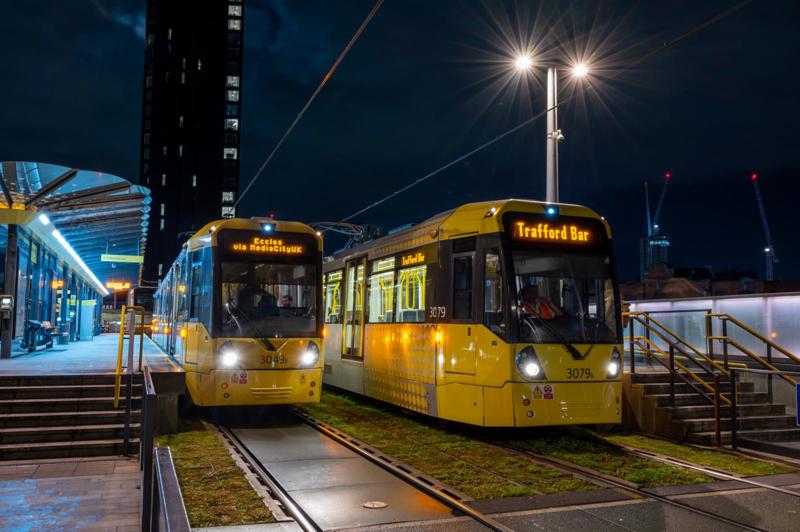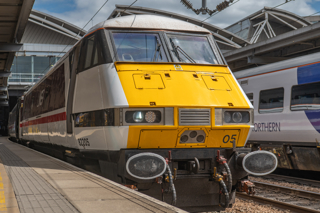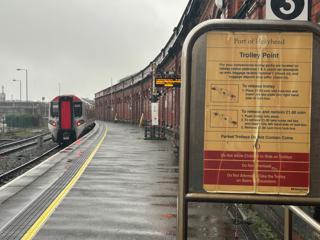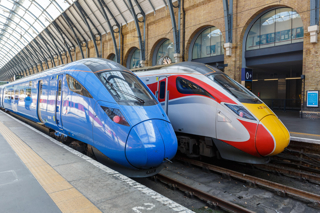A committed local approach or a more national path? Philip Haigh examines how rail franchises could be transformed in the coming years.
In this article:
A committed local approach or a more national path? Philip Haigh examines how rail franchises could be transformed in the coming years.
In this article:
- Advocates for local public control of rail services cite successes like Greater Manchester's Metrolink and the accountability of Merseyrail.
- Fragmented control across regions could complicate operations, stressing the need for efficiency in managing interconnected rail networks.
- The future might involve merging operators like Northern and TransPennine Express, with debates over how to best organise regional and national rail services under public ownership.

This year marks the 50th anniversary of the creation of the West Yorkshire Passenger Transport Executive (WYPTE).
Over the decades that followed, WYPTE invested in rail infrastructure and rolling stock. It owned trains - seven two-car Class 155 diesel multiple units and ten centre cars for Class 144 DMUs - as well as funding new stations and even electrification projects.
It also set fares and specified timetables for local services around West Yorkshire,, and introduced tickets such as the Daysaver that gave unlimited travel on its trains and buses.
Working to the instructions of the local politicians that formed the West Yorkshire Passenger Transport Authority, WYPTE gave local control over rail services provided by the nationalised monolith operator, British Rail.
The Passenger Transport Authority (PTA)/Passenger Transport Executive (PTE) structure dates back to the 1968 Transport Act, which Blackburn MP Barbara Castle took through Parliament during her tenure as a Labour transport minister.
This Act created PTAs and PTEs for the West Midlands, South East Lancashire and North East Cheshire (SELNEC, later Greater Manchester), Merseyside, Tyneside, and Greater Glasgow. WYPTE and its South Yorkshire equivalent came in 1974. Other changes added Wearside to Tyneside, while Greater Glasgow became Strathclyde.
Their equivalents today come under Combined Authorities, which provide the PTA function of representing local politicians. The PTEs themselves are history, but they provide a clear model for today’s Transport Secretary - Louise Haigh (another northern MP like Castle, but from the other side of the Pennines in Sheffield) - as she wrestles with the challenge of devolving local control of rail services while creating Great British Railways (GBR) to provide a directing mind/guiding hand over UK rail operations.
The PTEs presented strong brands while PTAs showed the difference that committed local politicians could bring to transport, provided they had the funds to match their ambitions.
Thus, Greater Manchester PTE delivered its Metrolink tram network, initially converting BR heavy rail routes into light rail operations, while West Midlands PTA helped electrify Birmingham’s Cross-City Line.
Strathclyde, meanwhile, all but declared independence from British Rail and its ScotRail brand to run rail services in the West of Scotland.
Yet local politicians could not have it all their own way. They could not fill BR’s tracks with local trains to the detriment of inter-urban and inter-city services - not least because they could see that their areas’ fortunes depended on those wider links, just as they needed local ones.
That pressure endures today. It has become most apparent at the meetings of Transport for the North (TfN), which is akin to a super-PTA with local councillors from across its patch - including the influential Combined Authority mayors such as Greater Manchester’s Andy Burnham and West Yorkshire’s Tracey Brabin.
Their challenge has been less with local services, but rather the balance between trains serving northern England and those running to London. This is most acute on the East Coast Main Line, where there is tension between running more trains from England’s North East to Manchester or to London.
This tension is also apparent with calls from northern politicians for better east-west links - including a new line, Northern Powerhouse Rail, which helped create the conditions for former Prime Ministers Boris Johnson and Rishi Sunak to cancel both northern legs of High Speed 2, which is set to cut rail capacity between Manchester and Birmingham.
It is certainly apparent at a local level in Manchester, where the lack of capacity along the Castlefield Corridor has forced local politicians to make difficult decisions about which services to prioritise.
Nevertheless, local leaders such as Burnham argue strongly for transport decisions to be taken close to passengers.
Asked at Transport for the North’s annual conference in Liverpool last February how rail could be transformed, he said: “I think there’s a simple answer to the question from both an infrastructure point of view and an operations point of view. And it’s three words: ‘Local public control’.
“We would deliver the infrastructure. We did that with Metrolink, so it’s not just an idle boast. We delivered the extension to the Trafford Centre, the new Trafford Park line, ahead of timetable and on budget. We’ve done that with building Metrolink, so we know we can do it.”
He added: “And then you look at operations, at rail operations. Merseyrail is the best-performing rail operator in the country. That comes from the accountability that is baked in to local public control because people are on the spot, and they will be challenged if that isn’t right.
“There’s accountability there, visible accountability that I’m afraid hasn’t been in rail operations, as far as I’m concerned, particularly working with private operators.”
Yet Burnham’s is not the only view. At the same conference, Nick Donovan (then Northern’s Managing Director and who has since retired) suggested that a network of powerful regional mayors would pull an operation such as Northern’s in many directions.
“That makes this job very, very difficult,” said Donovan.
“That’s my plea for today. That clarity of control is hugely important, especially across the north of England. It is a hugely interdependent and inter-connected network. Our own services run out of 23 train crew depots with 16 different train types, and almost every service will serve more than one city region across the North in terms of capacity into those main city hubs.
“We don’t do that because it’s fun to do it that way. We do it because there is a long history in driving efficient utilisation of resources, both in terms of trains and in terms of crews, to deliver the service that way.”
Louise Haigh appears to be following Burnham’s lead, telling the Evening Standard newspaper in July that she wants local mayors more involved in Great British Railways, including in planning, timetabling and running services.
But Donovan has a point. The Pennines are not a barrier to rail traffic between east and west. Their hills have tunnels - Summit, Standedge, Cowburn, and Totley - that link Greater Manchester and Yorkshire.
It’s likely to be more efficient to run Northern as a single operator on both sides, rather than returning it to the way British Rail latterly organised itself into Regional Railways North West and Regional Railways North East.
Which is not to say that Haigh’s Department for Transport should not examine how to best organise and group passenger services as they are brought back into public ownership.
For northern England, the two relevant operators already sit in the public sector, following the nationalisation of Northern in 2020 and TransPennine Express (TPE) in 2023.
It may prove more efficient to merge the two to give a single operator running between (for example) Leeds and Manchester, either via the ‘express’ route through Huddersfield or with the slower ‘stoppers’ via Hebden Bridge, with crews working as their competence or links allow.
Of course, merging them raises the prospect of staff working to different terms and conditions and different pay rates. Trade unions are not in the business of ‘levelling down’, which could lead to efficiencies in numbers being overtaken by higher wages as all staff are now doing the same work.
But if it’s better to merge Northern and TPE for the sake of Leeds-Manchester services, what of York-Edinburgh along the East Coast Main Line?
Here, TPE crews work many trains with rolling stock that’s almost identical to LNER’s (coincidentally, also an already nationalised operator, having switched from private ownership in 2018).
It seems unlikely that Scotland and Wales will give up their own ScotRail and Transport for Wales Rail operations, so that leaves the question of whether England moves to one rail operator as part of Great British Railways or continues with several subsidiaries along today’s lines or different boundaries.
DfT has yet to provide its answer to these questions. It is initially concentrating on nationalising passenger operations in England, with the publication on July 18 of its Passenger Railway Services (Public Ownership) Bill.
This Bill would ban the Transport Ssecretary from entering or extending any franchise agreement, and directs any relevant franchising authority (in practice the DfT for England) to only contract with public sector companies, which the Bill defines as companies wholly owned by the Transport Secretary, Scottish ministers or Welsh ministers (or jointly owned by the Transport Secretary and either Scottish or Welsh ministers).
There’s one exemption to the ban on extensions, and that permits the Transport Secretary to extend for up to two years (but no longer) a contract where it’s not considered practicable to transfer a service to a public operator.
As it stands, the Bill only allows companies owned by ministers to run rail services. It doesn’t allow for Manchester, for example, to run its own rail services. Yet Burnham has clear ambitions to roll out his Bee Network onto the rail network to complement his Bee Network buses.
Burnham’s Transport Commissioner, Vernon Everitt, said in July: “The final phase of bringing buses back under local control will be completed in January 2025 and, working with local communities, Transport for Greater Manchester and our bus operator partners will continuously improve the punctuality of services.
“As part of a new rapid transit strategy, we are working with the rail industry on a detailed timeline to bring eight local train lines into the Bee Network by 2028, alongside work to further extend the hugely successful Metrolink. Delivery of this plan will further increase ridership, driving up revenue for reinvestment in better services.”
One answer might be branding, with the prospect of trains on Burnham’s Bee Network bearing the same off-yellow colours as its buses and trams wear today.
This is nothing new. In its pomp, West Yorkshire PTE’s Metro brand and red colours adorned rolling stock as well as stations - and lives on today in bus shelters and rail station signage.
Birmingham also has a unifying brand across bus and rail, with its diamond symbol marking out public transport across its region.
Yet there is a way for Andy Burnham or his fellow mayors to run their own networks. The Bill now before Parliament amends 1993’s Railways Act (the act that privatised British Rail).
This Act defines franchises as agreements made between ministers (UK, Scottish or Welsh) and a company to provide rail services. It has been subsequently amended to allow the Transport Secretary to transfer responsibility for procuring rail services to organisations such as Passenger Transport Executives, Local Transport Authorities (LTAs), or a sub-national transport body (STB), of which Transport for the North is one.
It’s what allows Merseytravel, under Liverpool City Region Mayor Steve Rotheram, to contract rail services on his area’s third-rail network to Merseyrail (which is owned by Serco and Transport UK) under a 25-year deal which started in 2003.
As an aside, this is one of the contradictions of the new policy. We’ve seen Burnham praise Merseyrail’s performance, but it’s delivered by private contractors against which he and other Labour politicians have railed. And Burnham uses private operators to deliver his Bee Network bus operations.
Transport for London (TfL) has contracted Arriva to operate London Overground trains and MTR to operate Elizabeth line (Crossrail) services.
They do so under concessions where TfL decides what services to run.
When, in 2006, Transport Secretary Alistair Darling announced that TfL would be taking over what was then Silverlink Metro, he said it was to give the “London Mayor more control over rail services within London”.
So, Greater Manchester may yet see BR (Burnham Rail) created to run its local services, although it’s not clear how this might be arranged.
Burnham’s Combined Authority might create a wholly owned subsidiary company to employ staff and run trains.
It might have nationalised Northern deliver services on its behalf.
Or be a smaller part of a much-expanded northern English rail operator, perhaps procured by TfN.
Many of these questions depend on the form that Great British Railways takes as it seeks to join track and train back together.
For this, we must wait for a second Railways Bill, which is needed to bring GBR into formal existence.
Login to continue reading
Or register with RAIL to keep up-to-date with the latest news, insight and opinion.















Login to comment
Comments
No comments have been made yet.